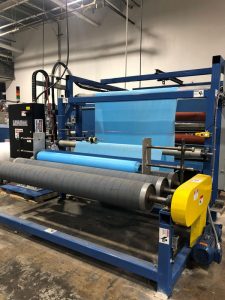 TOTOWA, N.J. — September 24, 2020 — Six months ago, when Precision Textiles put a toe in the water to try its hand at producing personal protective equipment (PPE), the strategy was designed to keep its plant open and employees working. But the strategy has been so successful, that the supplier of coated fabrics, nonwovens and laminations for the bedding, automotive, healthcare and home furnishings industries has now purchased additional manufacturing equipment to make the PPE line a permanent part of its product portfolio.
TOTOWA, N.J. — September 24, 2020 — Six months ago, when Precision Textiles put a toe in the water to try its hand at producing personal protective equipment (PPE), the strategy was designed to keep its plant open and employees working. But the strategy has been so successful, that the supplier of coated fabrics, nonwovens and laminations for the bedding, automotive, healthcare and home furnishings industries has now purchased additional manufacturing equipment to make the PPE line a permanent part of its product portfolio.
With the addition of six new laminating machines dedicated to producing medical gown fabric, Precision Textiles can now produce an additional 1.5 million yards of domestically-sourced fabric each month. These additional machines have allowed the company to hire 25 new machine line operators and supervisors that will solely produce medical gown fabric.
“When the coronavirus pandemic erupted, we began manufacturing medical gown and mask fabrics in order for us to remain an essential business. We saw what our country needed, and we were able to respond quickly to this demand. We see now that PPE materials made domestically and are readily available to meet the needs of our customers are more important than ever, and we look forward to further expanding into this category,” said Scott Tesser, CEO, Precision Textiles.
During the initial outbreak, Precision Textiles’ 210,000-square-foot manufacturing facility became an essential business providing more than 28 million yards of PPE to hospitals, businesses and non-profit organizations to-date. Along with production, which was completed in
the New Jersey factory, all the polyester staple film, TPU fiber and other materials used to make the fabrics were sourced domestically.
To continue making PPE domestically, Precision Textiles is committed to sourcing the necessary materials state-side, as well as bringing all PPE production to its U.S. facilities. This move will also create numerous of jobs within the industry.
“Over the course of my career, I watched how garment production slowly made its way overseas and never came back,” Tesser said. “I started in this business straight out of college; my father was in the apparel industry and my grandfather before him. I remember the days of garment racks being pushed down the streets and cutting rooms full of hustle. To me, it was what our country was built on. Hard work and labor. We were a country that made things.
“I was proud to be a part of that, and it’s time to bring manufacturing back to the United States. I don’t want to see our nation’s reliance on PPE in the hands of foreign manufacturers. We can and we will make it here,” he added.
Posted September 24, 2020
Source: Precision Textiles




